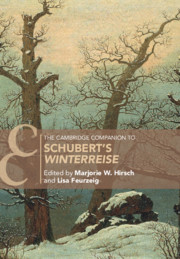Book contents
- The Cambridge Companion to Schubert’s Winterreise
- Cambridge Companions to Music
- The Cambridge Companion to Schubert’s Winterreise
- Copyright page
- Dedication
- Contents
- Figures
- Tables
- Music Examples
- Contributors
- Acknowledgments
- Note on Pitch
- Chronology
- Abbreviations
- Introduction: An Endless Winter Journey
- Part I Schubert’s Winterreise and Its Musical Heritage
- 1 Music and Culture in Schubert’s Vienna
- 2 Tradition and Innovation in Schubert’s Lieder
- 3 Precursors to Winterreise: Songs of Winter and Wandering, the Early Song Cycle
- Part II Die Winterreise: Poetic Cycle
- Part III Cultural and Historical Contexts
- Part IV Winterreise: Song Cycle
- Part V Winterreise After 1827
- Appendix
- Guide to Further Reading
- Index
2 - Tradition and Innovation in Schubert’s Lieder
from Part I - Schubert’s Winterreise and Its Musical Heritage
Published online by Cambridge University Press: 02 February 2021
- The Cambridge Companion to Schubert’s Winterreise
- Cambridge Companions to Music
- The Cambridge Companion to Schubert’s Winterreise
- Copyright page
- Dedication
- Contents
- Figures
- Tables
- Music Examples
- Contributors
- Acknowledgments
- Note on Pitch
- Chronology
- Abbreviations
- Introduction: An Endless Winter Journey
- Part I Schubert’s Winterreise and Its Musical Heritage
- 1 Music and Culture in Schubert’s Vienna
- 2 Tradition and Innovation in Schubert’s Lieder
- 3 Precursors to Winterreise: Songs of Winter and Wandering, the Early Song Cycle
- Part II Die Winterreise: Poetic Cycle
- Part III Cultural and Historical Contexts
- Part IV Winterreise: Song Cycle
- Part V Winterreise After 1827
- Appendix
- Guide to Further Reading
- Index
Summary
On August 19, 1815, a dozen years before undertaking Winterreise, Franz Schubert composed a song that treads similar poetic ground. Like the winter wanderer of Wilhelm Müller’s cycle, the protagonist of Johann Wolfgang von Goethe’s “An den Mond” (D259; To the Moon) roams through a natural landscape evoking inner terrain; the moonlit wood and valley conjure the recesses of his (or her) mind, intimating a journey of self-discovery. The protagonist’s present solitude, recollection of joyful and troubled times, glancing reference to faithless love, direct address to a river, allusion to the harshness of winter, mention of his own song, and mysterious closing reference to wandering by night through the labyrinth of the heart all anticipate ways that Müller, in a darker mode, conveys existential isolation and suffering in Winterreise.
- Type
- Chapter
- Information
- The Cambridge Companion to Schubert's ‘Winterreise' , pp. 24 - 42Publisher: Cambridge University PressPrint publication year: 2021

